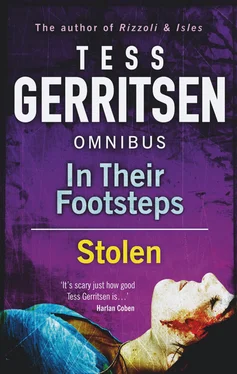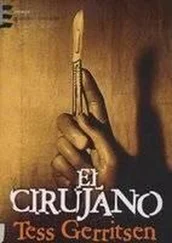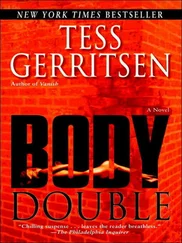She turned away. “They had no reason to be vulnerable to blackmail.”
“You were just a child, eight years old. Away at boarding school in England. What did you really know about them? About their marriage, their secrets? What if it was your mother who rented this flat? Met her lover here?”
“I don’t believe it. I won’t.”
“Is it so difficult to accept? That she was human, that she might have had a lover?” He took her by the shoulders, willing her to meet his gaze. “She was a beautiful woman, Beryl. If she’d wanted to, she could have had any number of lovers.”
“You’re making her out to be a tramp!”
“I’m considering all the possibilities.”
“That she sold out Queen and country? To keep some vile little secret from surfacing?” Angrily she wrenched away from him. “Sorry, Richard, but my faith runs a little deeper than that. And if you’d known them, really known them, you’d never consider such a thing.” She pivoted away and walked to the door.
“I did know them,” he said. “I knew them rather well.”
She stopped, turned to face him. “What do you mean by ‘rather well’?”
“We…moved in the same circles. Not the same team, exactly. But we worked at similar purposes.”
“You never told me.”
“I didn’t know how much I should tell you. How much you should know.” He began to slowly circle the room, carefully considering each word before he spoke. “It was my first assignment. I’d just completed my training at Langley—”
“CIA?”
He nodded. “I was recruited straight out of the university. Not exactly my first career choice. But somehow they’d gotten hold of my master’s thesis, an analysis of Libyan arms capabilities. It turned out to be amazingly close to the mark. They knew I was fluent in a few languages. And that I had taken out quite a large sum in student loans. That was the carrot, you see—the loan payoff. The foreign travel. And, I have to admit, the idea intrigued me, the chance to work as an Intelligence analyst…”
“Is that how you met my parents?”
He nodded. “NATO knew it had a security leak, originating in Paris. Somehow weapons data were slipping through to the East Germans. I’d just arrived in Paris, so there was no question that I was clean. They assigned me to work with Claude Daumier at French Intelligence. I was asked to compose a dummy weapons report, something close to, but not quite, the truth. It was encoded and transmitted to a few select embassy officials in Paris. The idea was to pinpoint the possible source of the leak.”
“How were my parents involved?”
“They were attached to the British embassy. Bernard in Communications, Madeline in Protocol. Both were really working for MI6. Bernard was one of a few who had access to classified files.”
“So he was a suspect?”
Richard nodded. “Everyone was. British, American, French. Right up to ambassadorial level.” Again he began to pace, carefully measuring his words. “So the dummy file went out to the embassies. And we waited to see if it would turn up, like the others, in East German hands. It didn’t. It ended up here, in a briefcase. In this very room.” He stopped and looked at her. “With your parents.”
“And that closed the file on Delphi,” she said. Bitterly she added, “How neat and easy. You had your culprit. Lucky for you he was dead and unable to defend himself.”
“I didn’t believe it.”
“Yet you dropped the matter.”
“We had no choice.”
“You didn’t care enough to learn the truth!”
“No, Beryl. We didn’t have the choice. We were instructed to call off the investigation.”
She stared at him in astonishment. “By whom?”
“My orders came straight from Washington. Claude’s from the French prime minister. The matter was dropped.”
“And my parents went on record as traitors,” she said. “What a convenient way to close the file.” In disgust she turned and left the room.
He followed her down the stairs. “Beryl! I never really believed Bernard was the one!”
“Yet you let him take the blame!”
“I told you, I was ordered to—”
“And of course you always follow orders.”
“I was sent back to Washington soon afterward. I couldn’t pursue it.”
They walked out of the building into the bedlam of Rue Myrha. A soccer ball flew past, pursued by a gaggle of tattered-looking children. Beryl paused on the sidewalk, her eyes temporarily dazzled by the sunshine. The street sounds, the shouts of the children, were disorienting. She turned and looked up at the building, at the attic window. The view suddenly blurred through her tears.
“What a place to die,” she whispered. “God, what a horrible place to die…”
She climbed into Richard’s car and pulled the door closed. It was a blessed relief to shut out the noise and chaos of Rue Myrha.
Richard slid in behind the driver’s seat. For a moment, they sat in silence, staring ahead at the ragamuffins playing street soccer.
“I’ll take you back to the hotel,” he said.
“I want to see Claude Daumier.”
“Why?”
“I want to hear his version of what happened. I want to confirm that you’re telling me the truth.”
“I am, Beryl.”
She turned to him. His gaze was steady, unflinching. An honest look if ever I’ve seen one, she thought. Which only proves how gullible I am. She wanted to believe him, and there was the danger. It was that blasted attraction between them—the feverish tug of hormones, the memory of his kisses—that clouded her judgment. What is it about this man? I take one look at his face, inhale a whiff of his scent, and I’m aching to tear off his clothes. And mine, as well.
She looked straight ahead, trying to ignore all those heated signals passing between them. “I want to talk to Daumier.”
After a pause, he said, “All right. If that’s what it’ll take for you to believe me.”
A phone call revealed that Daumier was not in his office; he’d just left to conduct another interview with Marie St. Pierre. So they drove to Cochin Hospital, where Marie was still a patient.
Even from the far end of the hospital corridor, they could tell which room was Marie’s; half a dozen policemen were stationed outside her door. Daumier had not yet arrived. Madame St. Pierre, informed that Lord Lovat’s niece had arrived, at once had Beryl and Richard escorted into her room.
They discovered they weren’t the only visitors Marie was entertaining that afternoon. Seated in chairs near the patient’s bed were Nina Sutherland and Helena Vane. A little tea party was in progress, complete with trays of biscuits and finger sandwiches set on a rolling cart by the window. The patient, however, was not partaking of the refreshments; she sat propped up in bed, a sad and weary-looking French matron dressed in a gray robe to match her gray hair. Her only visible injuries appeared to be a bruised cheek and some scratches on her arms. It was clear from the woman’s look of unhappiness that the bomb’s most serious damage had been emotional. Any other patient would have been discharged by now; only her status as St. Pierre’s wife allowed her such pampering.
Nina poured two cups of tea and handed them to Beryl and Richard. “When did you arrive in Paris?” she said.
“Jordan and I flew in yesterday,” said Beryl. “And you?”
“We flew home with Helena and Reggie.” Nina sat back down and crossed her silk-stockinged legs. “First thing this morning, I thought to myself, I really should drop in to see how Marie’s doing. Poor thing, she does need cheering up.”
Judging by the patient’s glum face, Nina’s visit had not yet achieved the desired result.
Читать дальше












